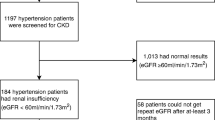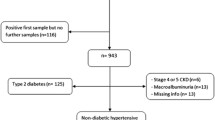Abstract
Data suggest increased rates of chronic kidney disease (CKD) in those with undiagnosed hypertension (HTN). Our study aimed to determine the prevalence of CKD in undiagnosed hypertensives in a previously unreported subgroup of individuals of South Asian ethnicity. We analysed data from subjects in the ADDITION-Leicester study, a UK based multiethnic, community diabetes screening study. Standard definitions included: HTN—mean recorded BP of ⩾140/90 mm Hg, CKD stage 3 and above—estimated glomerular filtration rate (eGFR) <60 ml min−1 per 1.73 m2 and microalbuminuria as albumin creatinine ratio ⩾3 mg mmol−1. Logistic regression was performed with age, gender and body mass index (kg m−2) as co-variates. 6082 individuals (52.5% female, mean age, 57.2 years; White European, 77.8% and South Asian, 22.0%), 31.1% had undiagnosed HTN. Overall, individuals with undiagnosed HTN compared with normotensives had an odds ratio for microalbuminuria of 2.24 (95% confidence interval (CI): 1.72–2.94). For South Asians, the odds ratio was 3.81. (95% CI: 2.24–6.47) for microalbuminuria with a trend towards an eGFR<60 ml min−1 per 1.73 m2. Future studies should consider intensified screening for HTN to refine the population suitable for CKD screening, particularly in the South Asian ethnic group.

Similar content being viewed by others
References
Levey AS, Atkins R, Coresh J, Cohen EP, Collins AJ, Eckardt KU et al. Chronic kidney disease as a global public health problem: approaches and initiatives–a position statement from Kidney Disease Improving Global Outcomes. Kidney Int 2007; 72: 247–259.
Zhang Q-L, Rothenbacher D . Prevalence of chronic kidney disease in population-based studies: systematic review. BMC Public Health 2008; 8: 117.
de Lusignan S, Chan T, Stevens P, O'Donoghue D, Hague N, Dzregah B et al. Identifying patients with chronic kidney disease from general practice computer records. Fam Pract 2005; 22: 234–241.
Go AS, Chertow GM, Fan D, McCulloch CE, Hsu CY . Chronic kidney disease and the risks of death, cardiovascular events, and hospitalization. New Engl J Med 2004; 351: 1296–1305.
Wen CP, Cheng TY, Tsai MK, Chang YC, Chan HT, Tsai SP et al. All-cause mortality attributable to chronic kidney disease: a prospective cohort study based on 462 293 adults in Taiwan. Lancet 2008; 371 (9631): 2173–2182.
Wilson JMG, Jungner G . Principles and practice of screening for disease. WHO: Geneva, Switzerland, 1968.
Hallan S, Stevens P . Screening for chronic kidney disease: which strategy? J Nephrol 2010; 23 (02): 147–155.
De Jong P, Curhan G . Screening, monitoring, and treatment of albuminuria: public health perspectives. J Am Soc Nephrol 2006; 17: 2120–2126.
Manns B, Hemmelgarn B, Tonelli M, Au F, Chiasson TC, Dong J et al. Population based screening for chronic kidney disease: cost effectiveness study. BMJ 2010; 341: c5869.
Hallan SI, Dahl K, Oien CM, Grootendorst DC, Aasberg A, Holmen J, Dekker FW . Screening strategies for chronic kidney disease in the general population: follow-up of cross sectional health survey. BMJ 2006; 333 (7577): 1047.
Crews DC, Plantinga LC, Miller ER 3rd, Saran R, Hedgeman E, Saydah SH et al. Centers for Disease Control and Prevention Chronic Kidney Disease Surveillance Team. Prevalence of chronic kidney disease in persons with undiagnosed or prehypertension in the United States. Hypertension 2010; 55 (5): 1102–1109.
Roderick PJ, Raleigh VS, Hallam L, Mallick NP . The need and demand for renal replacement therapy in ethnic minorities in England. J Epidemiol Community Health 1996; 50 (3): 334–339.
Webb DR, Khunti K, Srinivasan B, Gray LJ, Taub N, Campbell S et al. Rationale and design of the ADDITION-Leicester study, a systemic screening programme and Randomised Controlled Trial of multi-factorial cardiovascular risk intervention in people with Type 2 Diabetes Mellitus detected by screening. Trials 2010; 11: 16.
Levey AS, Stevens LA, Schmid CH, Zhang YL, Castro AF 3rd, Feldman HI et al. A new equation to estimate glomerular filtration rate. Ann Intern Med 2009; 150 (9): 604–612.
National Institute for Health and Clinical Excellence. Chronic Kidney Disease. National Institute for Health and Clinical Excellence: London, UK, 2008.
National Kidney Foundation. K/DOQI clinical practice guidelines for chronic kidneydisease: evaluation, classification and stratification. Am J Kidney Dis 2002; 39: S1–S266.
Verberk WJ, Kessels AG, de Leeuw PW . Prevalence, causes, and consequences of masked hypertension: a meta-analysis. Am J Hypertens 2008; 21: 969–975.
Bangash F, Agarwal R . Masked hypertension and white-coat hypertension in chronic kidney disease: a meta-analysis. Clin J Am Soc Nephrol 2009; 4: 656–664.
Kearney P, Whelton M, Reynolds K, Muntner P, Whelton P, He J . Global burden of hypertension: analysis of worldwide data. Lancet 2005; 365 (9455): 217–223.
Cutler JA, Sorlie PD, Wolz M, Thom T, Fields LE, Roccella EJ . Trends in hypertension prevalence, awareness, treatment, and control rates in United States adults between 1988-1994 and 1999-2004. Hypertension 2008; 52 (5): 818–827.
Department of Health. NHS Health Check Programme—Best Practice Guidance for the NHS Health Check Programmehttp://www.healthcheck.nhs.uk. (Last accessed9 January 2014).
Acknowledgements
We thank the ADDITION-Leicester screening team and all the primary care practices that took part in the study.
Author information
Authors and Affiliations
Corresponding author
Ethics declarations
Competing interests
Davies MJ—has acted as a consultant, advisory board member and speaker for Novartis, Novo Nordisk, Sanofi-Aventis, Lilly, Merck Sharp & Dohme and Roche, and as a speaker for Servier. She has received grants in support of investigator and investigator initiated trials from Novartis, Novo Nordisk, Sanofi-Aventis, Lilly, Pfizer, Merck Sharp & Dohme, GlaxoSmithKline and Servier. Webb DR—Novo Nordisk Research Foundation. Khunti K—has acted as a consultant and speaker for Novartis, Novo Nordisk, Sanofi-Aventis, Lilly and Merck Sharp & Dohme. He has received grants in support of investigator and investigator initiated trials from Novartis, Novo Nordisk, Sanofi-Aventis, Lilly, Pfizer, Boehringer Ingelheim and Merck Sharp & Dohme. The rest of the authors declare no conflict of interest.
Rights and permissions
About this article
Cite this article
Major, R., Davies, M., Crasto, W. et al. Association between undiagnosed hypertension and microalbuminuria in South Asians without known diabetes. J Hum Hypertens 29, 185–189 (2015). https://doi.org/10.1038/jhh.2014.62
Received:
Revised:
Accepted:
Published:
Issue Date:
DOI: https://doi.org/10.1038/jhh.2014.62
- Springer Nature Limited
This article is cited by
-
Asian Americans & chronic kidney disease in a nationally representative cohort
BMC Nephrology (2019)




